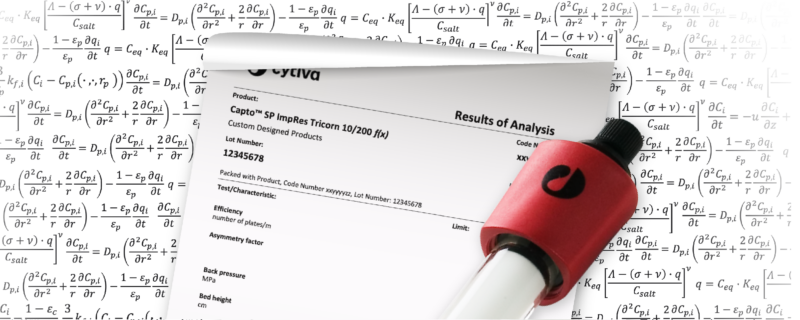
f(x) Columns for Mechanistic Chromatography Modeling
Mechanistic modeling is an approach that uses computer simulations based on known physiochemical phenomena to understand and describe a variety of chromatographic modes. These simulations can effectively decrease the number of physical experiments that need to be performed during downstream process development to optimize parameters that can affect chromatographic performance. Advantages of mechanistic modeling include time savings, improved process understanding and robustness, and support of regulatory decision making.
We have previously described the Cytiva GoSilico™ Chromatography Modeling Software that, once calibrated, enables the execution of in silico experiments that can generate thousands of purification options in a few hours. The model requires input of a set of column parameters which can be determined by conducting column characterization experiments. However, columns packing and column characterization can be time-consuming and demanding in terms of expert knowledge to ensure that accurate parameter values are produced.
To facilitate efficient and accurate model software calibration, Cytiva offers f(x) prepacked and pre-characterized chromatography columns. These Tricorn™ 10/200 or 10/100 columns are packed with high-productivity BioProcess™ resins and are specifically designed for process development experiments and process characterization. They serve as a valuable complement to GoSilico™ Chromatography Modeling Software, enabling rapid and reliable calibration of models.

With pre-characterized f(x) columns, key parameter values are readily accessible and accurate: these columns are supplied with a Results of Analysis, which contains column-specific data tailored for mechanistic modeling workflows. It ensures accurate model parameter values and reduces the time required for column characterization. List of possible parameters includes (the list varies depending on the given resin or technique):
- Bed height (cm)
- Total porosity, εtot
- Interstitial porosity, εinterstitial
- Ionic capacity, Λ, column specific (in μmol/mL resin backbone)
- Bed volume (mL)
- Bead radius (µm)
- Specific adsorber surface area (m-1)
- Ligand density (µmol/m2)
f(x) columns are available pre-packed with a variety of polishing resins suitable for ion exchange and multimodal chromatography processes, with more f(x) columns under active development.

By using prepacked and pre-characterized f(x) chromatography columns, scientists can save time and resources during process development, streamline their workflows, and obtain reliable data for mechanistic modeling, leading to more efficient and optimized downstream purification processes.
For more information:
Learn more about f(x) columns for mechanistic modeling of chromatography
Discuss mechanistic modeling with a technical specialist
